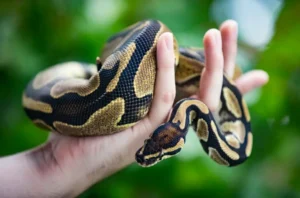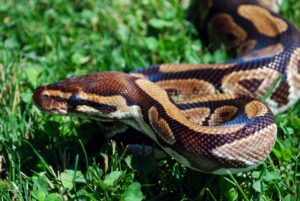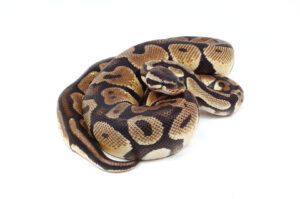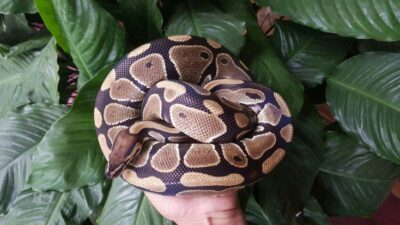Are ball pythons friendly like humans? Understanding the social dynamics and temperament of these captivating reptiles is a fascinating journey into the world of exotic pets.
Yes, ball pythons are generally known for their docile and gentle nature, making them one of the more popular choices among snake enthusiasts and pet owners. While individual personalities can vary, ball pythons are often considered friendly and easy to handle.
They are known for their calm demeanor, making them suitable for both novice and experienced reptile keepers. Regular and gentle interaction with proper care can help foster a bond between the snake and its owner, contributing to a positive and friendly relationship.
However, it’s essential to remember that each snake is unique, and factors such as handling experience, environment, and health can influence their behavior.
Are ball pythons friendly?

Ball pythons are generally known for their docile and calm nature, making them one of the more popular choices among snake enthusiasts and pet owners. While individual personalities can vary, ball pythons are often considered to be relatively friendly and easy to handle. They tend to be less aggressive or defensive compared to some other snake species.
However, it’s essential to keep in mind that each snake is unique, and their behavior can be influenced by factors such as genetics, upbringing, and individual temperament. Regular handling and proper care are crucial in establishing a positive relationship with your ball python. Additionally, it’s important to approach any snake with respect and caution, as they may become stressed or defensive if they feel threatened.
If you’re considering getting a ball python as a pet, make sure to do thorough research on their care requirements, habitat, and proper handling techniques to ensure a positive and enjoyable experience for both you and the snake.
Characteristics of Ball Pythons
Ball pythons (Python regius) are popular as pets due to their manageable size, docile nature, and beautiful color variations. Here are some key characteristics of ball pythons:
- Size:
- Adult ball pythons typically reach a length of 3 to 5 feet (0.9 to 1.5 meters). Females are generally larger than males.
- Color and Pattern:
- Ball pythons showcase a wide variety of colors and patterns. Common morphs include albino, pied, pastel, and many more, creating an array of visually striking appearances.
- Behavior:
- They are known for their calm and docile temperament. Ball pythons are generally slow-moving and are more likely to curl into a ball when stressed or frightened, hence their name.
- Lifespan:
- With proper care, ball pythons can live for 20 to 30 years in captivity.
- Habitat:
- Native to sub-Saharan Africa, ball pythons inhabit grasslands, savannas, and sparsely wooded areas. They are primarily ground-dwelling, seeking shelter in burrows and termite mounds.
- Feeding:
- Ball pythons are constrictors, meaning they kill prey by squeezing it until it can no longer breathe. In captivity, they are typically fed a diet of appropriately sized rodents.
- Reproduction:
- Female ball pythons lay clutches of eggs rather than giving birth to live young. The incubation period for the eggs is around two months.
- Nocturnal:
- Ball pythons are primarily nocturnal, meaning they are more active during the night. They may spend much of the day hiding in their shelters.
- Hiding Behavior:
- Ball pythons often exhibit a desire to hide and may feel stressed if they don’t have a secure hiding place in their enclosure.
- Ball Curling:
- When feeling threatened or stressed, ball pythons have a defensive behavior of curling into a ball, with their head in the center and the rest of their body forming a protective circle.
- Easy to Handle:
- Due to their generally gentle nature, ball pythons are often recommended as good snakes for beginners. Regular, gentle handling from a young age can help maintain their calm demeanor.
Remember that individual snakes can have unique personalities, and their behavior may be influenced by various factors. Providing a proper and secure habitat, regular feeding, and gentle handling contribute to a healthy and content ball python.
Common reasons for keeping ball pythons as pets
People choose to keep ball pythons as pets for various reasons, and their popularity in the pet trade has increased over the years. Here are some common reasons why individuals choose ball pythons as pets:
- Manageable Size:
- Ball pythons are relatively small compared to some other snake species, making them more manageable for those with limited space.
- Docile Nature:
- Ball pythons are known for their calm and docile temperament. Their generally gentle disposition makes them suitable for novice snake keepers.
- Beautiful Color Morphs:
- The availability of numerous color and pattern morphs in ball pythons has contributed to their popularity among enthusiasts and collectors. Breeders have developed a wide variety of visually striking morphs, ranging from albinos to pieds and beyond.
- Long Lifespan:
- With proper care, ball pythons can live for two to three decades, providing a long-term companion for those committed to their care.
- Low Maintenance:
- Ball pythons are considered relatively low-maintenance compared to some other reptiles. They don’t require as much attention or interaction as mammals and can be suitable for individuals with busy lifestyles.
- Nocturnal Behavior:
- The nocturnal nature of ball pythons can be appealing to people who are more active during the evening hours. They are often more active and engaging during nighttime.
- Educational Value:
- Keeping ball pythons can be an educational experience for individuals interested in learning about reptile behavior, biology, and captive husbandry.
- Breeding Opportunities:
- Ball pythons are commonly bred in captivity, and many hobbyists find joy in breeding and working with different morphs. Breeding projects allow enthusiasts to contribute to the diversity of captive-bred ball pythons available in the market.
- Fascination with Snakes:
- Some people are naturally drawn to snakes and find them fascinating. The unique biology, behavior, and appearance of ball pythons can appeal to those interested in the world of reptiles.
- Availability in the Pet Trade:
- Ball pythons are readily available in the pet trade, making them accessible to a wide range of individuals interested in keeping a snake as a pet.
Understanding Ball Python Temperament

Understanding the temperament of ball pythons is crucial for responsible ownership. While individual snakes can vary in behavior, ball pythons are generally known for their docile nature. Here are some key aspects of their temperament:
- Calm Demeanor:
- Ball pythons are often calm and easygoing, making them suitable for handling. They are not known for being aggressive or defensive, especially when compared to some other snake species.
- Tendency to Ball Up:
- When stressed or threatened, ball pythons may exhibit a defensive behavior known as “balling up.” They coil into a tight ball with their head in the center, protecting themselves from potential threats. This behavior is where their common name originates.
- Tolerance for Handling:
- With proper and regular handling, ball pythons can become accustomed to human interaction. Many individuals find that their ball pythons tolerate handling well, making them suitable pets for those who enjoy interacting with their snakes.
- Nocturnal Activity:
- Ball pythons are primarily nocturnal, meaning they are more active during the night. While they may spend a significant amount of time hiding during the day, they can become more active and responsive during the evening.
- Slow Movements:
- Ball pythons move slowly and deliberately, which adds to their generally calm demeanor. Their slow movements contribute to their reputation as easy-to-handle snakes.
- Hiding Behavior:
- Ball pythons have a natural instinct to seek shelter and hide, especially during the daylight hours. Providing a secure hiding place in their enclosure helps them feel safe and reduces stress.
- Individual Variation:
- While ball pythons share common characteristics, individual variation exists. Some may be more outgoing and tolerant of handling, while others might be a bit more reserved. Factors such as genetics, early socialization, and past experiences can influence their behavior.
- Feeding Response:
- Ball pythons are typically good eaters, and their feeding response is generally not aggressive. However, it’s essential to establish a consistent feeding routine and avoid unnecessary handling around feeding time to prevent stress.
- Stress Sensitivity:
- Ball pythons can be sensitive to stress, and sudden changes in their environment or handling practices can impact their well-being. Minimizing stressors, providing a stable environment, and using gentle handling techniques contribute to a content and healthy snake.
- Communication through Body Language:
- Observing your ball python’s body language can provide insights into its mood and comfort level. Being attuned to signs of stress or discomfort, such as defensive postures or hissing, helps you respond appropriately.
Common misconceptions about ball python aggression
Ball pythons are generally known for their docile nature, but there are some common misconceptions about their aggression that can arise due to misunderstandings or misinformation.
Here are a few misconceptions about ball python aggression:
- Aggressive Nature:
- Misconception: Some people may mistakenly believe that ball pythons are inherently aggressive or dangerous.
- Reality: Ball pythons are typically not aggressive by nature. They are known for their calm demeanor and are more likely to curl into a ball when stressed rather than exhibit aggressive behavior. Instances of aggression in ball pythons are rare and often result from stress, fear, or improper handling.
- Striking without Warning:
- Misconception: Some may think that ball pythons can strike unpredictably and without warning.
- Reality: Ball pythons usually provide warning signs before striking. They may adopt a defensive posture, hiss, or coil into a ball to signal discomfort or stress. Understanding their body language helps owners recognize when a ball python may feel threatened.
- Fear of Biting:
- Misconception: There may be a fear that ball pythons are prone to biting.
- Reality: While any snake may bite in self-defense, ball pythons are not known for being particularly prone to biting. Bites are often the result of stress, mishandling, or misinterpretation of the snake’s behavior. With proper handling and care, the risk of being bitten by a ball python is minimal.
- Size Equals Aggression:
- Misconception: Some people might assume that larger ball pythons are more aggressive.
- Reality: The size of a ball python does not necessarily correlate with aggression. Larger individuals can be just as docile as smaller ones. It’s essential to consider the snake’s behavior, past experiences, and overall health rather than relying on size as an indicator of aggression.
- Frequent Biting during Feeding:
- Misconception: People may believe that ball pythons commonly bite during feeding.
- Reality: Ball pythons usually associate feeding with their food source, and bites during feeding are relatively rare. However, it’s crucial to avoid handling the snake around feeding time to reduce the risk of accidental bites.
- Aggression as a Default Response:
- Misconception: There might be a misconception that ball pythons default to aggression as a response to various situations.
- Reality: Ball pythons typically prefer to avoid confrontation and may choose to hide or ball up when stressed. Aggressive behavior is usually a last resort and is more commonly seen when the snake feels cornered or threatened.
It’s important for prospective snake owners to educate themselves about the specific needs and behaviors of ball pythons. Understanding their natural tendencies, providing proper care, and practicing gentle handling techniques are key factors in fostering a positive relationship with these reptiles and minimizing any potential misconceptions about aggression.
Tips for Building a Bond

Building a bond with your ball python can be a rewarding experience and contributes to their overall well-being. While snakes may not exhibit affection in the same way as mammals, they can become accustomed to their owners and tolerate handling.
Here are some tips for building a bond with your ball python:
- Start Early:
- If possible, begin handling your ball python from a young age. This helps them get used to human interaction and reduces stress associated with handling as they grow older.
- Consistent Handling:
- Handle your ball python regularly but be mindful not to overdo it. Consistent, gentle handling helps build trust, and the snake becomes more accustomed to your presence.
- Use Slow Movements:
- Move slowly and deliberately when handling your ball python. Sudden or quick movements can startle them, leading to stress and potential defensive behavior.
- Respect Their Space:
- While handling is essential, it’s equally important to respect your snake’s need for privacy. Ensure that your ball python has a secure hiding place in its enclosure, and avoid disturbing them when they retreat to this space.
- Associate Handling with Positive Experiences:
- Create positive associations with handling by offering food or treats shortly afterward. This can help your ball python see handling as a positive experience rather than a stressful one.
- Handle During Non-Feeding Times:
- Avoid handling your ball python on the same day or shortly before feeding. Snakes can be more defensive during this time, and you want to minimize any stress-related behaviors.
- Be Patient:
- Building a bond takes time, especially with animals that have a more reserved nature like ball pythons. Be patient and allow the snake to acclimate to your presence gradually.
- Respect Their Body Language:
- Learn to interpret your ball python’s body language. If they show signs of stress or discomfort (such as hissing, coiling tightly, or other defensive postures), give them space and allow them to calm down.
- Provide Enrichment:
- Offer environmental enrichment in the form of climbing branches, hiding spots, and other items in the enclosure. This helps create a stimulating environment for your ball python, contributing to their overall well-being.
- Hand Feed Occasionally:
- Hand-feeding can be a way to build trust. However, be cautious and ensure that your snake associates your hand with positive experiences. Not all ball pythons will readily accept hand-fed prey items.
- Stay Calm and Relaxed:
- Snakes can sense stress and tension. Stay calm and relaxed during handling sessions, and avoid acting nervously, as this can transfer anxiety to your ball python.
Remember that each snake is an individual, and the rate at which they become comfortable with handling can vary. Respect their boundaries, and always prioritize their well-being. Building a bond with a ball python is a gradual process that requires time, patience, and understanding.
Signs of distress or discomfort
Understanding the signs of distress or discomfort in a ball python is crucial for responsible ownership. When a snake is stressed, it can exhibit various behaviors and physical signs. Here are some common indicators that your ball python may be experiencing distress:
- Hissing:
- If your ball python hisses, it is a defensive response, signaling that it feels threatened or stressed. Hissing is often accompanied by other defensive postures.
- Defensive Postures:
- Ball pythons may adopt defensive postures when they feel threatened. This can include coiling into a tight ball, raising their head, or displaying other defensive body language.
- Striking:
- A ball python may strike if it feels cornered or threatened. This is a defensive behavior and a clear sign that the snake is stressed.
- Retreating or Hiding:
- If your ball python spends an excessive amount of time hiding or retreating to its hiding spot, it may be a sign of stress. Providing a secure hiding place is essential, but if the snake constantly seeks refuge, it could indicate discomfort.
- Excessive Flicking of the Tongue:
- While it’s normal for ball pythons to flick their tongues to gather scent information, excessive or rapid tongue flicking can be a sign of stress or nervousness.
- Loss of Appetite:
- A sudden loss of interest in food or refusing to eat can be a sign of stress or underlying health issues. Changes in feeding behavior should be monitored closely.
- Unusual Shedding Issues:
- Difficult or incomplete sheds can be a result of stress. Ensure proper humidity levels and provide a humidity box during shedding to help your snake shed its skin more easily.
- Rapid or Labored Breathing:
- If your ball python is breathing rapidly or appears to be struggling to breathe, it could indicate stress, respiratory issues, or improper environmental conditions.
- Restlessness:
- Constant pacing or restlessness within the enclosure may suggest that the snake is stressed. This could be due to factors such as inadequate space, inappropriate temperatures, or other stressors.
- Agitation during Handling:
- If your ball python becomes agitated, squirms excessively, or exhibits defensive behavior during handling, it may be stressed. Give the snake some time to acclimate to handling, and avoid forcing interaction.
- Color Changes:
- Changes in color, such as becoming excessively dark or displaying unusual patterns, can be a sign of stress. A healthy ball python will typically have vibrant and regular coloration.
- Eye Cap Retention:
- Difficulty shedding the eye caps or retaining them after shedding can indicate an issue. This could be due to low humidity levels or other stressors.
If you notice any of these signs, it’s essential to investigate and address potential causes of stress promptly. Factors such as inappropriate temperature, humidity, or enclosure setup can contribute to stress in ball pythons.
Also, if you are unsure about the cause of distress or discomfort, consulting with a veterinarian experienced in reptile care is recommended. Regular observation and understanding your snake’s behavior will help you provide the best possible care for your ball python.
Conclusion
Ball pythons are generally considered friendly and docile pets. Their calm demeanor, manageable size, and relatively low maintenance make them popular choices among snake enthusiasts and beginners alike.
While individual personalities may vary, proper care, handling, and socialization can contribute to a positive and rewarding relationship with these fascinating reptiles. Are ball pythons friendly? Yes, with the right care and attention, ball pythons can be wonderful companions for those interested in keeping snakes as pets.

